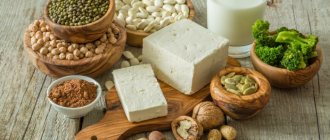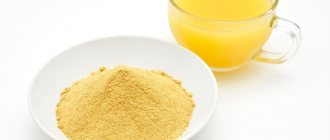Benefits of lecithin
Maintaining optimal levels of lecithin in the body provides the following positive effects:
- Activation of brain activity and strengthening of memory
- this is explained by the fact that one of the main components of lecithin, phosphatidylcholine, in the presence of pantothenic acid (vitamin B5) is transformed into acetylcholine - the main neurotransmitter responsible for intelligence, memory and concentration;
- Getting rid of tobacco addiction
– the amino acid acetylcholine mentioned above enters into a competitive interaction with nicotine and fights for the same nerve receptors, so taking lecithin helps to weaken the physiological nicotine addiction and overcome the bad habit;
- Preservation of strength and conductivity of nerve fibers
– lecithin is involved in the synthesis of myelin, an insulator and protector of nerve fibers. When the myelin sheath becomes thinner, nerves lose their ability to conduct impulses and then die. That is why, especially in adulthood and old age, a person needs to provide his body with a sufficient amount of lecithin;
- Proper absorption of fat-soluble vitamins
– entering the blood, lecithin phospholipids act as an emulsifier and transform it into a liquid homogeneous emulsion in which lipids, amino acids, vitamins A, , E, K are evenly dissolved. In this form, beneficial substances easily spread throughout the body and perform their functions;
- Normalization of bile composition and prevention of cholelithiasis
– the emulsifying properties of lecithin allow it to provide the optimal chemical composition and flexibility of bile, interfere with the formation of cholesterol gallstones and promote the dissolution of existing hard fatty deposits on the walls of the gallbladder and in the bile ducts;
- Protection and restoration of liver cells
– one of the most important beneficial functions of lecithin. Phospholipids strengthen the membranes of hepatocytes and liver cells, dissolve and remove excess fats from the liver and help it cope with the daily work of cleaning the blood from poisons and toxins, including alcohol;
- Regulation of cholesterol metabolism and prevention of atherosclerosis
– in the presence of lecithin, “bad” cholesterol (LDL) in the blood is split into separate, small lipid fractions and freely transported, and in conditions of lecithin deficiency, cholesterol, on the contrary, sticks to the walls of blood vessels and forms plaques, which leads to the development of atherosclerosis - a deadly obstruction arteries;
- Strengthening the heart muscle and protecting against heart attack
– lecithin phospholipids are involved in the synthesis of L-carnitine, a valuable amino acid responsible for providing muscle tissue with energy. You've probably heard about this substance if you're into sports or bodybuilding: L-carnitine makes muscles flexible and elastic, and also helps them increase in size. But the main muscle of our body is the heart, and it also really needs L-carnitine;
- Unlocking a child's intellectual potential
– the lecithin that a baby receives in the first year of life determines his memory capacity, mental abilities and the degree of resistance of brain cells to the destructive effects of negative factors and aging. This is why pediatricians are strongly in favor of breastfeeding, because breast milk contains the highest concentration of easily digestible lecithin;
- Maintaining respiratory health and preventing lung cancer
– lecithin is necessary for the production of surfactants, the main components of the elastic lipid film surrounding the pulmonary alveoli. The preservation of this film ensures adequate filling of the alveoli and prevents their collapse. Thus, the process of gas exchange and oxygen saturation of the blood, the resistance of the lungs to damage by toxins, aging and cancer indirectly depend on lecithin;
- Extension of reproductive age and protection against genital cancer
– firstly, both male (testosterone) and female (estrogen, progesterone) sex hormones are produced from cholesterol, but for this it must be in a dissolved state. What ensures the homogeneity of cholesterol if not choline and inositol, the components of lecithin? Secondly, in the presence of lecithin phospholipids, estradiol is transformed into estriol, a much less oncogenic form of the hormone. Thus, lecithin not only prolongs reproductive age, but also protects against genital cancer;
- Maintaining pancreatic function and preventing diabetes
– lecithin prevents the aging of the pancreas, helps it synthesize the hormone insulin, and also increases the sensitivity of insulin receptors. This allows healthy people to consume more carbohydrates without the risk of developing diabetes, and for those who are already sick, lecithin helps reduce the intake of insulin and glucose-lowering drugs.
Beneficial features
The main function is the supply of phospholipids. All cell walls and membranes, the shell of the last nerve fibers, consist of; they also transport fats, cholesterol, and fatty acids. Therefore, lecithin:
● supports the functioning of the nervous system;
● accelerates fat metabolism;
● reduces the level of harmful triglycerides (reduces the risk of developing atherosclerosis);
● has a positive effect on the condition of blood vessels;
● strengthens the myocardium.
In second place are antioxidant properties - participation in cellular renewal and regeneration. The liver, the main “filter” of our body, consists of 50% lecithin. Taking lecithin dietary supplements allows you to restore its function and accelerate the elimination of toxins. Such supplements also stimulate insulin synthesis.
For lecithin deficiency:
● all cognitive functions suffer;
● coordination of movements is impaired;
● gastroenterological pathologies develop;
● there is poor heart function.
For women
Restoration of sleep, protection against depression and stress, neuroprotective effect. Together with medications, the supplement allows you to restore the menstrual cycle, and during menopause, improve overall well-being. It can also be used in complex therapy of gynecological diseases - mastopathy, endometriosis, benign neoplasms.
Taking the product has a good effect on the appearance of the skin and hair - shiny and stronger.
For men
This is the prevention of atherosclerosis, stroke, and heart attack. The use of lecithin preparations prevents a decrease in potency and has a positive effect on spermatogenesis.
The most valuable is lecithin, synthesized from sunflower - it does not contain phytoestrogens that negatively affect male reproductive function.
In childhood
Children are actively maturing their nervous system. That is why lecithin is vital for them - it serves as a building tool for nerve fibers and neurons. Due to its effect on the immune system, the product allows you to quickly adapt to a new environment, provides protection against infectious diseases, and makes it easier to get used to the school load.
It’s good if the child gets most of the lecithin from regular foods (nuts, seeds, meat, fish). The pediatrician must decide whether to take additional tablet forms.
Harm of lecithin
Lecithin has unique properties as a surfactant, emulsifier and dispersant:
- When two immiscible liquid substances combine
, for example, oils and water, lecithin reduces the surface tension of the cell membranes of the oil and allows these substances to be converted into a homogeneous emulsion;
- When combining liquid and solid substances
lecithin works as a dispersant - it quickly soaks the dry fraction and mixes it with liquid into a homogeneous elastic mass;
- When two solid substances combine
lecithin acts as a lubricant and prevents molecules of one fraction from sticking to molecules of another.
These functions have made lecithin an indispensable tool in the food industry. With the addition of lecithin, fatty sauces, mayonnaise, butter, margarine and spreads, chocolate, confectionery creams and glazes, sweets, pastries, cakes, rolls, waffles and many other products are produced. Lecithin is especially often used during the preparation of confectionery and baking, since it not only promotes good baking and non-sticking to molds, but also significantly extends the freshness of cakes and pastries.
Soy lecithin is registered in the international register of food additives under the code E322 and is approved for use in food production throughout the world.
The cosmetics industry also readily uses the E322 additive in the production of creams, lotions, emulsions, serums, lipsticks and other beauty and health products. We have already stated above what role lecithin plays in the pharmaceutical industry - dietary supplements and hepatoprotectors are made from it.
Almost 100% of the lecithin we see on food, cosmetics and medicine labels comes from soy. Vegetable protein is 90% digestible by humans, and it is not burdened with harmful animal fat, so it is simply impossible to deprive cheap soy of its leadership position in this area. And is it necessary? After all, the harm of soy lecithin has not been confirmed by any authoritative scientific study.
However, for some reason there are always rumors about the dangers of lecithin. Believing them or not is everyone’s personal choice, but let’s still try to identify all the sources of consumer dissatisfaction and figure out whether these concerns and fears can be justified by science?
The vast majority of references to the dangers of lecithin are related to the problem of GMOs, and here is what scientists say about it:
- Genetically modified soybeans from Southeast Asia are an incredibly convenient raw material for the production of lecithin, because they grow quickly, do not get sick, bear fruit abundantly, are stored for a long time and cost a penny. Such soybeans have flooded the market in China, the USA and other large food-consuming countries. It also seeps into the Russian market, although it is prohibited by law. Professor D. Faganiz (maharishi university of management fairfield, USA), says the following about genetically modified soybeans: “Genetics bring affordable and tasty products to our table that contain foreign proteins. How these proteins will behave in the future, and what impact they will have on the body of each individual person and the population as a whole, only time can show. GMOs are Russian roulette";
- Although “commercial” soy lecithin has been present in the human diet relatively recently (about 30 years), there is already scientific evidence of numerous cases of allergies to products containing it, especially in children, regardless of whether the lecithin was used: genetically modified or regular. On the other hand, it is very difficult to determine whether lecithin is harmful, or some other food additive from the same finished products;
- A group of researchers from the University of Hawaii, USA, studied the effects of soy isoflavones on the brain and came to the conclusion that regular consumption of genetically modified soy lecithin leads to an inability to fully absorb amino acids, and, as a result, to a decrease in intelligence and weakening of long-term memory;
- In 1959, a highly controversial scientific study was conducted in the United States, according to which soy isoflavones destroy the thyroid gland. Spurred by interest in GMOs, scientists at the US National Toxicology Center repeated this study in 1997 and concluded that genetically modified soy lecithin does suppress thyroid function;
- Another danger that awaits lovers of cheap soy is phytoestrogens, substances similar to hormones that compete for the effect on the corresponding receptors in the body of all mammals, including humans. Scientists have recently discovered a stunning mechanism by which soybeans fight to survive in nature. Animals eat soy - phytoestrogens enter the blood and inhibit reproductive function - the population of soy eaters is declining! That is, the plant itself acts as something like an oral contraceptive;
- Even in those countries where GMO lecithin is not prohibited, pediatricians strongly do not recommend giving children under three years of age ready-made products containing it: cakes, muffins, rolls, chocolate bars, sweet bars, cheesecakes, creams and sauces. Very often, consumption of such products leads to allergies, diathesis, neurodermatitis, atopic dermatitis, and sometimes even asthma and diabetes, not to mention obesity;
- Expectant mothers should definitely beware of genetically modified lecithin, since there is already evidence that this substance increases the risk of premature birth, leads to abnormal formation of the nervous system and genital organs of the fetus, and greatly increases the likelihood that the unborn child will develop severe forms of allergies.
It is important to understand that all talk about the dangers of lecithin is associated only with low-quality, dangerous, genetically modified plant raw materials. Lecithin as such is simply irreplaceable for humans: it is enough to recall that our liver consists of 50% of it, and our brain - 30%. It is simply impossible to find harmful lecithin in baby food or certified vitamin complexes: these products in Russia undergo strict sanitary and epidemiological control before hitting the shelves.
Another thing is ready-made food products, such as muffins with an astronomical shelf life or exotic sauces from sunny Asia. When buying them, especially when giving them to children, you always take a risk. In order not to think about the dangers of lecithin and not to be afraid for the health of your family, just follow the advice of nutritionists: buy food fresh, cook at home more often, minimize the consumption of ready-made meals and drinks, the label of which in volume and content is more similar to the script of a science-fiction thriller .
Side effects and contraindications
Excess causes no less harm than deficiency. Main manifestations of overdose:
- diarrhea;
- vomiting, nausea;
- migraines, dizziness.
To avoid unpleasant consequences, you should take dietary supplements according to the instructions.
Contraindications include individual intolerance, allergies to components, and gastroenterological diseases in the acute stage.
Soy lecithin also affects hormonal levels. For this reason, men and women during lactation and pregnancy are recommended to buy sunflower-based products.
Lecithin for children
It is difficult to even find words to describe how important lecithin is for the health and full development of children. A deficiency of lecithin phospholipids interferes with the adequate absorption of fat-soluble vitamins, and this is fraught with rickets, scoliosis and osteoporosis. A lack of choline and acetylcholine can cause delays in the baby’s mental and physical development, suppressed immunity, underdevelopment of the genital organs, and blood clotting disorders.
The daily norm of lecithin for children is 1-4 g. The consequences of lecithin deficiency in the first year of life are irreversible - it can no longer be replenished, and lost intellectual potential cannot be returned.
In children under three years of age, lecithin deficiency is manifested by the following symptoms:
- Increased intracranial pressure and severe headaches;
- Whims, tearfulness, lethargy, restless sleep;
- Psychomotor and speech development disorders;
- Reduced immunity and frequent colds.
In children 3-12 years old, a lack of lecithin in the diet results in other problems:
- Poor concentration, poor memory, poor academic performance;
- Difficulties in adapting to new living conditions and educational groups;
- Emotional instability, aggression, uncontrollable behavior;
- Increased fatigue, muscle weakness;
- Again, low immune status and frequent colds.
If you suspect your baby has a lecithin deficiency, especially if the child eats poorly, overeats and refuses healthy, nutritious meals, consult your pediatrician about taking lecithin. The drug for children is available in the form of gel, granules and capsules. The delicious fruit gel can be given to infants starting at four months of age. For older children, granules are suitable because they can be easily added to liquid food. And children from 8 to 16 years old can take lecithin in capsules themselves. The dosage and duration of treatment are indicated in the instructions, but are sometimes adjusted by the doctor.
Reception features
In some cases, the use of lecithin may cause mixed reactions. Therefore, it is necessary to weigh all the advantages and disadvantages of its use.
Pregnancy
Despite all the naturalness of lecithin, it is not recommended to take it in the first three months after conception. Reason: Supplementation for the embryo and fetus has not yet been studied. In the second and third trimesters, this point should be agreed upon with your obstetrician-gynecologist. The supplement can be prescribed when indicated when the benefit to the mother outweighs the potential harm.
When breastfeeding
Most instructions indicate that the drug can be taken while breastfeeding, but with caution. The possibility of a negative reaction in the baby is small, but the material substance may be useful. Again, it is best to consult your pediatrician first.
For children
The compound is necessary for the full development of babies; it is not without reason that it is added even to mixtures. It strengthens the immune system, activates growth, and has a positive effect on cognitive functions: memory, attention, thinking. During the feeding period, the baby partially receives lecithin from mother's milk, but after stopping breastfeeding, the amount of lecithin consumed drops sharply. It is recommended for schoolchildren who experience high mental stress and suffer from malnutrition more than adults.
As a food additive, a child can receive lecithin after one year in the absence of contraindications. It is better to choose a gel form or soluble capsules. To avoid overdose, follow the instructions.
If your baby has chronic or congenital diseases, consult your pediatrician first.
To lose weight
The compound is involved in the breakdown of fats, normalization of metabolism, and accelerates metabolism. It actively removes toxins and waste, increases the absorption of healthy foods. It is useful to use for weight loss during the training process.
It is worth noting the effect on the skin: the latter becomes more elastic and toned. The severity of cellulite and stretch marks is reduced.
For gastroenterological pathologies
For gastritis of tissues, it accelerates regeneration and helps to quickly cope with the manifestations of inflammation.
For cholecystitis, inflammation of the pancreas, drink only in the remission stage due to the active secretion of bile, which can provoke the movement of gallstones and exacerbation of pancreatic symptoms. It is more useful as a means of preventing the specified pathologies.
In diabetes - regulates the concentration of glucose in the blood, increases insulin synthesis, reduces the need for insulin injections.
Lecithin for pregnant women
Preventive intake of lecithin during pregnancy and lactation is your contribution to the future, since this way you will provide your baby with good health and good mental potential. Most gynecologists prescribe lecithin-containing multivitamin complexes to their patients, starting in the second trimester of pregnancy. It is believed that in the first trimester, when the reserves of the mother’s body are still almost untouched, the fetus will be provided with lecithin. In addition, it is better to generally minimize the interference of any foreign substances in the body when the main organs and systems of the fetus are formed.
The daily requirement for lecithin in pregnant women increases by about 30% and amounts to 8-10 g, but compensating for the deficiency with fatty products of animal origin is a big mistake!
Almost all expectant mothers gain excess weight during pregnancy, and are very worried about this. One of the main causes of the problem is food whims and excessive consumption of fatty foods. You cannot limit yourself in food, but you should try to maintain a healthy balance between proteins, fats and carbohydrates throughout pregnancy. And the increased need for lecithin can be easily met with the help of appropriate medications.
Preventive intake of lecithin provides pregnant women with the following benefits:
- Increasing the chance of survival of a premature baby due to a stronger respiratory system;
- Relief of joint and back pain caused by the heaviness of the abdomen and redistribution of the load on the skeleton;
- Preserving the health and beauty of hair, nails, skin and teeth;
- Regulates lipid metabolism, reduces the level of “bad” cholesterol and protects against excess weight gain.
Chemical composition
Lecithin was originally synthesized from egg yolk. In modern production, it is extracted from soybean oil or sunflower seeds after careful processing.
Appearance: yellow waxy particles. It has high solubility in water. The composition is esters, a mixture of triglycerides and phospholipids (and to a lesser extent glycolipid compounds).
It is present in small doses in regular food. Dietary supplements with lecithin can be bought in pharmacies and stores.
Lecithin supplements contain esters, carbohydrates, PUFAs, vitamin E, phospholipids and biopigments. After passing through the digestive tract, they form:
- phosphoric acid;
- glycerol molecules;
- vitamin B4;
- polyunsaturated fatty acids.
How to take lecithin: instructions for use
The optimal dosage form for adults is lecithin powder. It is usually taken one teaspoon three times a day with meals. The powder can be poured into any non-hot dish or drink: salad, juice, kefir, yogurt, porridge.
Powdered lecithin is absorbed very quickly and penetrates into the blood, so the positive effect of taking it is felt almost immediately.
Notes:
- Opened packages of lecithin powder should be stored for no longer than 60 days in a dark, cool and dry place;
- For patients with exacerbation of cholecystitis, pancreatitis and cholelithiasis, lecithin can be taken only with great caution and under medical supervision, since it has a choleretic effect and accelerates the removal of gallstones;
- Those who take high doses of lecithin for a long time (more than 3 tablespoons per day) need to add vitamin C to their diet to protect against nitrosamines, products of choline metabolism, and calcium to bind excess phosphorus.
Indications for use of lecithin
Indications for the use of lecithin are:
- Pregnancy and lactation.
- Delayed mental and physical development in children.
- Senile weakness and memory impairment.
- Neuroses, depression, insomnia, chronic fatigue syndrome.
- Nicotine and alcohol addiction.
- Acute and chronic gastrointestinal diseases: gastritis, pancreatitis, cholecystitis, etc.
- Vitamin deficiency and decreased immunity.
- Liver diseases: hepatitis, fatty hepatosis, cirrhosis, etc.
- Increased blood cholesterol levels, atherosclerosis.
- Heart diseases: ischemia, angina pectoris, cardiomyopathy, myocarditis, etc.
- Multiple sclerosis and other autoimmune diseases.
- Psoriasis, eczema, neurodermatitis.
- Respiratory diseases: bronchitis, pneumonia, tuberculosis, etc.
- Sexual dysfunctions: impotence, infertility, decreased libido, etc.
- Diabetes and obesity.
- Diseases of the kidneys and urinary tract: glomerulonephritis, pyelonephritis, enuresis, etc.
- Eye problems: optic nerve atrophy, retinal degeneration.
- Diseases of the oral cavity and teeth: periodontal disease, pulpitis, caries, etc.
- Increased intracranial pressure.
- Intense physical activity and active sports.
Where is it contained?
Since lecithin is of plant origin, it is present in small amounts in regular foods:
- cereals;
- legumes;
- seeds and nuts;
- caviar;
- egg yolk;
- liver (beef and chicken);
- meat and fish.
However, with pathologies, stress, and strain, significantly improved compounds are required, which can only be replenished with the help of dietary supplements. Lecithin can be purchased at regular pharmacies or online stores. They sell premium brands, characterized by a high degree of final purification.
Analogs
In certain situations (for example, allergies), lecithin can be replaced. The following nutrients are similar to it in their main characteristics:
- Choline. It also supports the functioning of the nervous system, has a hepatoprotective function, normalizes fat metabolism, supports prostate function, and reduces the need for insulin.
- Folic acid. Necessary for the period of rapid development of new cells, important during the period of rapid development and growth.
- Methionine. Amino acid-hepatoprotector, provides protection of the nervous system, prevention of atherosclerotic changes.
Choosing the right one
There are two main forms - sunflower and soy. Both are equally beneficial for health, but soy is not recommended for allergy sufferers due to the presence of protein in the corresponding one. In addition, sunflower does not contain phytoestrogens - natural compounds that cause estrogenic or antiestrogenic effects.
Pay attention to the composition of the supplement you purchase. The main components in it should be phospholipids and fatty acids.
The choice of form depends on your convenience. Liquid and gel forms are usually prescribed to children.
Role in the human body
Lecithin is a fat-like substance and a kind of phospholipid complex that is necessary for the construction of cell walls. It is responsible for the regeneration of tissues, primarily nerves. When lecithin is broken down in the intestines, choline is formed, which is necessary for the normal transmission of impulses from one nerve cell to another. If the body lacks this substance, the person becomes irritable, experiences increased tiredness and fatigue, and has problems with memory and attention.
Another important function of lecithin is to provide liver protection. Based on the element, medications (hepatoprotectors) are made that help the organ break down fats and cleanse the body of waste, toxins and breakdown products











